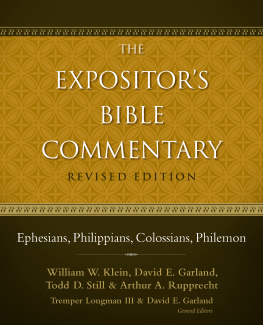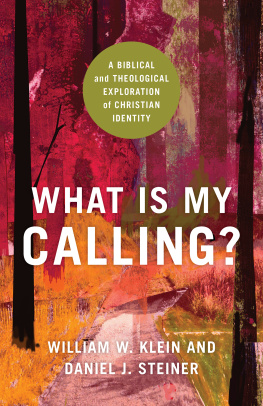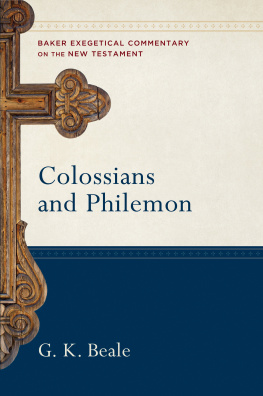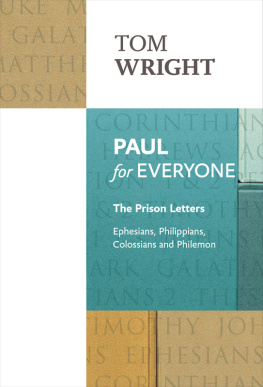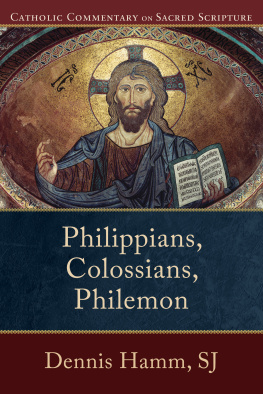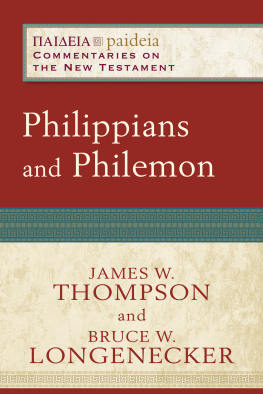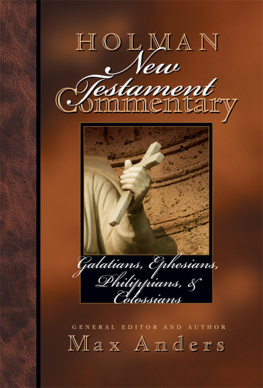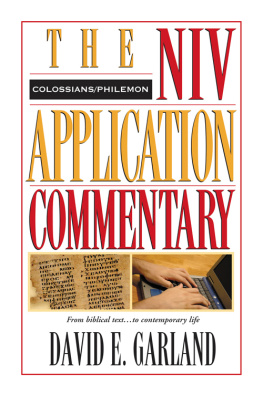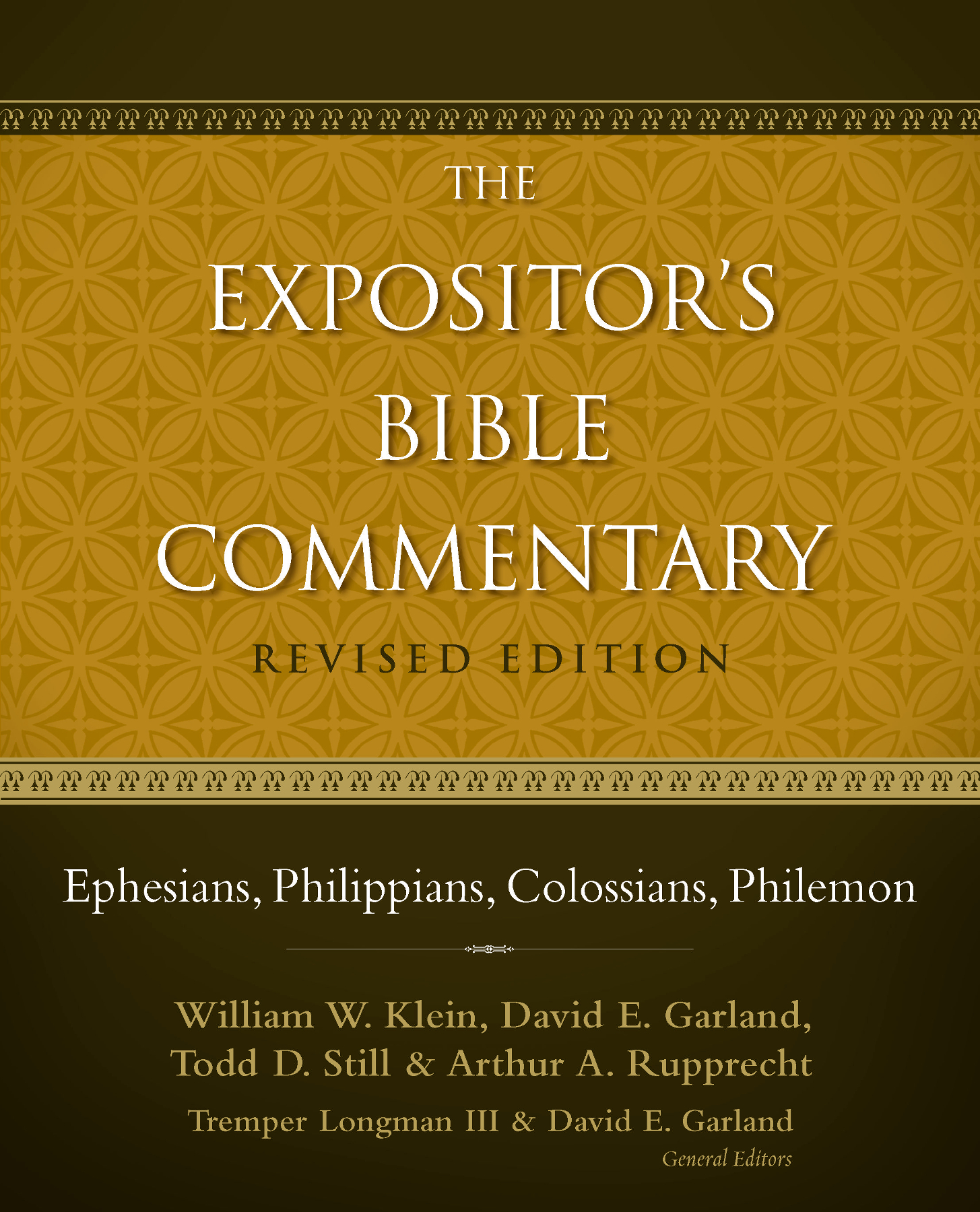
Ephesians, Philippians, Colossians, Philemon
The Expositors Bible Commentary
Revised Edition
William W. Klein, David E. Garland, Todd D. Still, and Arthur A. Rupprecht
Tremper Longman III and David E. Garland, General Editors
ZONDERVAN
Ephesians, Philippians, Colossians, Philemon
EphesiansCopyright 2006 by William W. Klein
PhilippiansCopyright 2006 by David E. Garland
ColossiansCopyright 2006 by Todd D. Still
PhilemonCopyright 2006 by Arthur A. Rupprecht
Previously published in Ephesians-Philemon.
All rights reserved under International and Pan-American Copyright Conventions. By payment of the required fees, you have been granted the non-exclusive, non-transferable right to access and read the text of this e-book on-screen. No part of this text may be reproduced, transmitted, downloaded, decompiled, reverse engineered, or stored in or introduced into any information storage and retrieval system, in any form or by any means, whether electronic or mechanical, now known or hereinafter invented, without the express written permission of Zondervan.
ePub Edition: ISBN 978-0-310-53206-4
Requests for information should be addressed to:
Zondervan, 3900 Sparks Dr. SE, Grand Rapids, Michigan 49546
The Library of Congress cataloged the printed edition as follows:
The expositors Bible commentary / [general editors], Tremper Longman III and David E. Garland.Rev.
p. cm.
Includes bibliographical references.
ISBN 978-0-310-23503-3 (hardcover)
1. Bible. N.T.Commentaries. I. Longman, Tremper. II. Garland, David E.
BS2341.53.E96 2005
220.7dc22 2005006281
All Scripture quotations, unless otherwise indicated, are taken from The Holy Bible, New International Version, NIV. Copyright 1973, 1978, 1984 by Biblica, Inc. Used by permission of Zondervan. All rights reserved worldwide. www.Zondervan.com. The NIV and New International Version are trademarks registered in the United States Patent and Trademark Office by Biblica, Inc.
Scripture quotations marked NASB are taken from the New American Standard Bible. Copyright 1960, 1962, 1963, 1968, 1971, 1972, 1973, 1975, 1977, 1995 by The Lockman Foundation. Used by permission. (www.Lockman.org).
Any Internet addresses (websites, blogs, etc.) and telephone numbers in this book are offered as a resource. They are not intended in any way to be or imply an endorsement by Zondervan, nor does Zondervan vouch for the content of these sites and numbers for the life of this book.
All rights reserved. No part of this publication may be reproduced, stored in a retrieval system, or transmitted in any form or by any meanselectronic, mechanical, photocopy, recording, or any otherexcept for brief quotations in printed reviews, without the prior permission of the publisher.
CONTENTS
Ephesians: William W. Klein (Ph.D., University of Aberdeen) is professor of New Testament at Denver Seminary in Littleton, Colorado.
Philippians: David E. Garland (Ph.D., Southern Baptist Theological Seminary) is associate dean of academic affairs and William M. Hinson professor of Christian Scriptures at George W. Truett Seminary, Baylor University, in Waco, Texas.
Colossians: Todd D. Still (Ph.D., University of Glasgow) is associate professor of Christian Scriptures at George W. Truett Seminary, Baylor University, in Waco, Texas.
Philemon: Arthur A. Rupprecht (Ph.D., University of Pennsylvania) is professor of classical languages at Wheaton College in Wheaton, Illinois.
General editor: Tremper Longman III (Ph.D., Yale University) is professor of biblical studies at Westmont College in Santa Barbara, California.
General editor: David E. Garland (Ph.D., Southern Baptist Theological Seminary) is associate dean of academic affairs and William M. Hinson professor of Christian Scriptures at George W. Truett Seminary, Baylor University, in Waco, Texas.
Frank Gaebelein wrote the following in the preface to the original Expositors Bible Commentary (which first appeared in 1979): The title of this work defines its purpose. Written primarily by expositors for expositors, it aims to provide preachers, teachers, and students of the Bible with a new and comprehensive commentary on the books of the Old and New Testaments. Those volumes achieved that purpose admirably. The original EBC was exceptionally well received and had an enormous impact on the life of the church. It has served as the mainstay of countless pastors and students who could not afford an extensive library on each book of the Bible but who wanted solid guidance from scholars committed to the authority of the Holy Scriptures.
Gaebelein also wrote, A commentary that will continue to be useful through the years should handle contemporary trends in biblical studies in such a way as to avoid becoming outdated when critical fashions change. This revision continues the EBCs exalted purpose and stands on the shoulders of the expositors of the first edition, but it seeks to maintain the usefulness of the commentary by interacting with new discoveries and academic discussions. While the primary goal of this commentary is to elucidate the text and not to provide a guide to the scholarly literature about the text, the commentators critically engage recent academic discussion and provide updated bibliographies so that pastors, teachers, and students can keep abreast of modern scholarship.
Some of the commentaries in the EBC have been revised by the original author or in conjunction with a younger colleague. In other cases, scholars have been commissioned to offer fresh commentaries because the original author had passed on or wanted to pass on the baton to the next generation of evangelical scholars. Today, with commentaries on a single book of the Old and New Testaments often extending into multiple volumes, the need for a comprehensive yet succinct commentary that guides one to the gist of the texts meaning is even more pressing. The new EBC seeks to fill this need.
The theological stance of this commentary series remains unchanged: the authors are committed to the divine inspiration, complete trustworthiness, and full authority of the Bible. The commentators have demonstrated proficiency in the biblical book that is their specialty, as well as commitment to the church and the pastoral dimension of biblical interpretation. They also represent the geographical and confessional diversity that characterized the first contributors.
The commentaries adhere to the same chief principle of grammatico-historical interpretation that drove the first edition. In the foreword to the inaugural issue of the journal New Testament Studies in 1954, Matthew Black warned that the danger in the present is that theology, with its head too high in the clouds, may end by falling into the pit of an unhistorical and uncritical dogmatism. Into any new theological undertaking must be brought all that was best in the old ideal of sound learning, scrupulous attention to philology, text and history. The dangers that Black warned against over fifty years ago have not vanished. Indeed, new dangers arise in a secular, consumerist culture that finds it more acceptable to use Gods name in exclamations than in prayer and that encourages insipid theologies that hang in the wind and shift to tickle the ears and to meet the latest fancy. Only a solid biblical foundation can fend off these fads.
The Bible was not written for our information but for our transformation. It is not a quarry to find stones with which to batter others but to find the rock on which to build the church. It does not invite us simply to speak of God but to hear God and to confess that his Son, Jesus Christ, is Lord to the glory of God the Father (Php 2:10). It also calls us to obey his commandments (Mt 28:20). It is not a self-interpreting text, however. Interpretation of the Holy Scriptures requires sound learning and regard for history, language, and text. Exegetes must interpret not only the primary documents but all that has a bearing, direct or indirect, on the grammar and syntax, historical context, transmission, and translation of these writings.
Next page
